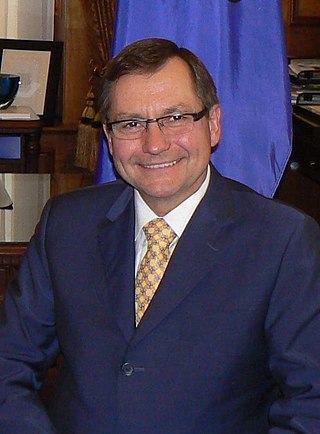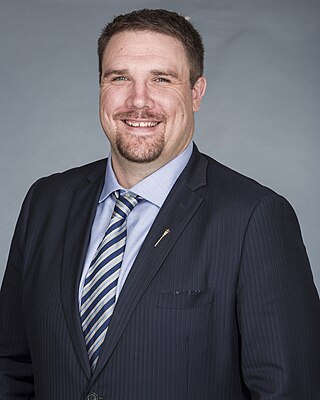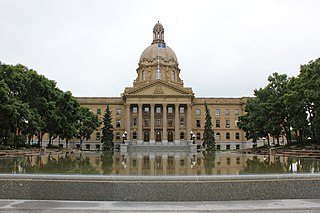
Transgender rights in Canada, including procedures for changing legal gender and protections from discrimination, vary among provinces and territories, due to Canada's nature as a federal state. According to the 2021 Canadian census, 59,460 Canadians identify as transgender. Canada was ranked third in Asher & Lyric's Global Trans Rights Index in 2023.

Edward Michael Stelmach is a Canadian politician who served as the 13th premier of Alberta, from 2006 to 2011. The grandson of Ukrainian immigrants, Stelmach was born and raised on a farm near Lamont and fluently speaks the distinctive Canadian dialect of Ukrainian. He spent his entire pre-political adult life as a farmer, except for some time spent studying at the University of Alberta. His first foray into politics was a 1986 municipal election, when he was elected to Lamont County council. A year into his term, he was appointed reeve. He continued in this position until his entry into provincial politics.

There are three general sources of Singapore law: legislation, judicial precedents, and custom.
Alberta Health Services (AHS) is the single health authority for the Canadian province of Alberta and the "largest integrated provincial health care system" in Canada. Headquartered in Edmonton, AHS delivers medical care on behalf of the Government of Alberta's Ministry of Health. It operates 850 facilities throughout the province, including hospitals, clinics, continuing care facilities, mental health facilities and community health sites, that provide a variety of programs and services. AHS is the largest employer in the province of Alberta. In 2019, AHS served 4.3 million Albertans with a staff of 125,000 staff and 10,000 physicians, and an annual budget of $15.365 billion. Sean Chilton is the Acting President and CEO of AHS and reports to Dr. John Cowell, the AHS Official Administrator. The Official Administrator is accountable to the Minister of Health and the Premier.

Marlaina Danielle Smith is a Canadian politician, former lobbyist, and former columnist and media personality who has been serving as the 19th premier of Alberta and leader of the United Conservative Party (UCP) since October 2022.

Thomas Kyle Dang is a former Canadian politician who was elected in the 2015 Alberta general election to the Legislative Assembly of Alberta representing the electoral district of Edmonton-South West. Dang is the youngest MLA to ever be elected in Alberta. He later sat as an independent MLA.

Jason John Nixon is a Canadian politician and the current Minister of Seniors, Community and Social Services of Alberta. He is member of the Legislative Assembly of Alberta representing the electoral district of Rimbey-Rocky Mountain House-Sundre.
Richard Wilson is a Canadian politician elected in the 2019 Alberta general election to represent the electoral district of Maskwacis-Wetaskiwin in the 30th Alberta Legislature. On April 30, 2019, he was appointed to the Executive Council of Alberta as the Minister of Indigenous Relations. He was re-elected in the 2023 provincial election held on May 29.

Rajan Sawhney is a Canadian politician from the United Conservative Party in Alberta. She was elected in the 2019 Alberta general election to represent the electoral district of Calgary-North West in the 30th Alberta Legislature. On April 30, 2019, she was appointed to be the Minister of Community & Social Services in the Executive Council of Alberta. On July 8, 2021, she was shuffled into the Minister of Transportation.

Tyler Shandro is a Canadian politician who served as the minister of justice and solicitor general of Alberta from February 2022 to June 2023. A member of the United Conservative Party (UCP), Shandro was elected to represent Calgary-Acadia in the Legislative Assembly of Alberta in the 2019 provincial election. He was Alberta's minister of health from 2019 to 2021, and minister of labour and immigration from 2021 until he was named justice minister in 2022. He lost re-election in the 2023 provincial election.
Kelechi "Kaycee" Madu is a Canadian lawyer and politician. As a member of the United Conservative Party (UCP), Madu represented Edmonton-South West in the Legislative Assembly of Alberta from 2019 to 2023. He was elected in the 2019 provincial election. He was Alberta's minister of municipal affairs from 2019 to 2020, minister of justice and solicitor general of Alberta from 2020 to 2022.
Jason Copping is a Canadian politician who was the minister of health for Alberta from September 21, 2021, to June 9, 2023. Elected in the 2019 Alberta general election to represent the electoral district of Calgary-Varsity, Copping is a member of the United Conservative Party (UCP). He previously was the labour and immigration minister from April 20, 2019, to September 21, 2021.

The 30th Alberta Legislative Assembly was constituted after the general election on April 16, 2019. The United Conservative Party (UCP), led by Jason Kenney, won a majority of seats and formed the government. The New Democrats, led by outgoing Premier Rachel Notley, won the second most seats and formed the official opposition. The premiership of Jason Kenney began on April 30, 2019, when Jason Kenney and his first cabinet were sworn in by Lieutenant Governor of Alberta, Lois Mitchell. On October 11, 2022, Kenney resigned, and Danielle Smith, the new leader of the UCP, was sworn in as premier by Lieutenant Governor Salma Lakhani. The 30th Legislature was dissolved on May 1, 2023, triggering a general election on May 29.

The Public Sector Wage Arbitration Deferral Act is a bill, informally known as the "bargaining rights bill", introduced by the Province of Alberta's United Conservative Party (UCP) government under Premier Jason Kenney, during the 30th Alberta Legislature, constituted after the general election on April 16, 2019. Bill 9 was passed on June 20, 2019. According to Alberta Finance Minister Travis Toews, Bill 9 suspends and delays hearings related to wage arbitration for public sector workers until October 31, 2019 in order to allow time for the provincial government to study the August 2019 finance report of the MacKinnon panel. Bill 9 affects 180,000 public service employees in Alberta that are represented by unions in 24 collective agreements.

The premiership of Jason Kenney spanned from April 2019 until October 2022, when Jason Kenney and his cabinet were sworn in by Lieutenant Governor of Alberta, Lois Mitchell. Kenney was invited to form the 30th Alberta Legislature and became the 18th Premier of Alberta, following the 2019 Alberta general election where Kenney's United Conservative Party (UCP) won a majority of seats in the Alberta Legislature leading to the resignation of Premier Rachel Notley. Kenney stepped down as leader of the UCP party on May 18, 2022, after receiving 51.4% of the UCP party members' votes. His premiership ended shortly after Danielle Smith won the subsequent leadership election and was sworn in as premier.
Health Sciences Association of Alberta (HSAA) is a trade union in Alberta, Canada, which represents approximately 29,800 members.
Alberta's Ministry of Health is a ministry of the Executive Council of Alberta whose major responsibilities include setting "policy and direction to achieve a sustainable and accountable health system to promote and protect the health of Albertans."

The Alberta Sovereignty Within a United Canada Act, commonly known as the Alberta Sovereignty Act, is an act introduced on November 29, 2022, the first day of the fall sitting of the 4th Session of the 30th Alberta Legislature by the Premier of Alberta, Danielle Smith, and passed on December 8, 2022. The act seeks to protect Alberta from federal laws and policies that the Alberta legislature deems to be unconstitutional or harmful to Albertans or the province's economic prosperity, in areas such as natural resources, gun control, COVID-19 public health, education, and agriculture.

The premiership of Danielle Smith began on 11 October 2022 when she was sworn in by Lieutenant Governor of Alberta, Salma Lakhani. Smith won the 2022 United Conservative Party leadership election to replace then Alberta Premier Jason Kenney on October 6, 2022, and was appointed as the 19th Premier of Alberta. Her cabinet was sworn in on 22 October.

The 32nd Alberta general election will be held in Alberta, Canada, to elect the members of the Legislative Assembly of Alberta. According to Alberta's Election Act, it is scheduled for October 18, 2027, but that does not affect the powers of the Lieutenant Governor of Alberta to dissolve the legislature before that time, in accordance with the usual conventions of the Westminster parliamentary system.












